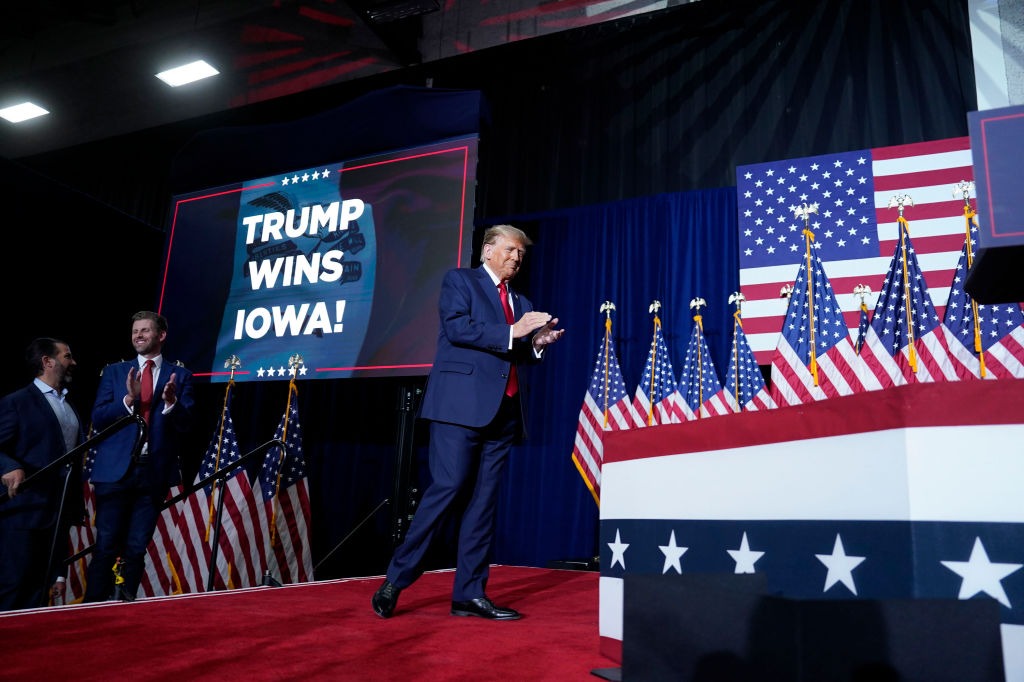Happy Tuesday! The Iowa caucuses are over, and we’re still cold.
Up to Speed
- Donald Trump delivered a record win for a Republican candidate in Iowa’s quadrennial presidential nominating caucuses, capturing an outright majority with 51 percent of the vote. Florida Gov. Ron DeSantis finished second with 21 percent and Nikki Haley, the former South Carolina governor and ex-U.S. ambassador to the United Nations, was close behind with 19 percent. Vivek Ramaswamy, the wealthy biotech entrepreneur who spent tens of millions of dollars of his own money and hosted hundreds of events in Iowa, finished fourth with nearly 8 percent. He suspended his campaign Monday evening and endorsed the former president.
- The major outlets covering the race, from Fox News to CNN to the Associated Press, called the contest for Trump strikingly early—around 7:30 p.m. CT, 30 minutes after the caucuses began and long before many caucusgoers had finished voting. Team DeSantis cried foul, with spokesman Andrew Romeo saying in a statement that “the media is in the tank for Trump and this is the most egregious example yet.” DeSantis’ campaign manager James Uthmeier told NBC News that at caucus precincts where he spoke, “while I’m presenting and delivering the closing argument for Ron DeSantis and actually flipping voters, people start getting alerts on their phone saying the race is over.”
- DeSantis and Haley nonetheless vowed to continue their campaigns for the 2024 GOP presidential nomination. At his West Des Moines watch party, DeSantis touted his second-place finish, telling supporters that “we got our ticket punched out of Iowa.” Just down the road, Haley claimed (somewhat inscrutably) that “tonight, Iowa made this Republican primary a two-person race.” The Haley campaign issued a memorandum Monday evening downplaying Trump’s victory in the caucuses, spinning the win as disappointing for a quasi-incumbent and arguing the contests ahead were now “effectively” a de facto head-to-head battle with Trump. The former president leads Haley by 14 points in New Hampshire, according to the RealClearPolitics polling average, with DeSantis securing just under 7 percent of the vote. On Monday night, DeSantis was still planning to fly to South Carolina for a brief campaign stop before jetting to New Hampshire in advance of next Tuesday’s “first in the nation” primary, while Haley headed straight to New Hampshire from Iowa.
- The Haley campaign and her supportive super PAC, SFA Inc., both unveiled new television advertisements Tuesday morning to run in New Hampshire. The Haley campaign’s spot lumps Trump and President Joe Biden together, declaring them “the two most disliked politicians in America” who are “consumed by chaos, negativity, and grievances.” The SFA Inc. ad paints Trump as a “bully” who is “lying about Nikki.” The ads show a clear Granite-State strategy: Haley and her backers are ignoring DeSantis and taking exclusive aim at the former president.
- To that end, Haley announced Tuesday morning that she is done debating DeSantis and will not participate in any televised faceoff that does not include Trump. “We’ve had five great debates in this campaign,” she tweeted Tuesday morning. “Unfortunately, Donald Trump has ducked all of them. He has nowhere left to hide. The next debate I do will either be with Donald Trump or with Joe Biden. I look forward to it.” That means that unless Trump reverses course for the first time this primary season and chooses to participate, Thursday’s scheduled debate in Manchester, New Hampshire, hosted by ABC News and WMUR, is off.
Despite Hawkeye Holdouts, Trump Preaches a Unity Message

DES MOINES, Iowa—Make all the necessary caveats: Election-night feelings run high, bitter primaries give way to solidarity-building general elections, and dissatisfied voters, when faced with a binary choice, usually come back home to their home party to roost.
Still, it was remarkable how many Iowa voters backing Ron DeSantis and Nikki Haley told The Dispatch some version of the same thing Monday evening after Donald Trump’s commanding caucus victory: If he’s the nominee, count them out.
“I would think that’s ridiculous,” Wyatt Landuyt-Krueger, a young DeSantis supporter at the Florida governor’s post-caucus watch party in West Des Moines, said of a potential Trump-Biden rematch. “And when I go to vote in November, my vote’s going to either be left blank or I’m going to write in RFK Jr. Because, you know, I don’t like either one of them, and it’s time we stop electing people who should be living in elder-care facilities.”
“That’s a sad matchup,” added Ellen Crozier of West Des Moines, also supporting DeSantis. “I don’t know that that gives a good option to a lot of young individuals, young parents.”
“I can’t believe that out of 340 million Americans, those are the two best options that we can come up with,” a Haley supporter named Greg told us from an elementary school caucus site in suburban Waukee. “But yes, I cannot see myself voting for Trump under any circumstances. He’s an insurrectionist and a criminal, and I will not support him.”
Those are just snapshots of the odd narrative split-screen that continues to define this Republican primary.
Trump’s 30-point margin of victory on a frigid, low-turnout caucus night was by far the largest a non-incumbent Republican has ever achieved in Iowa. The other candidates’ finishes were as beneficial to his campaign as he could have hoped: DeSantis and Haley just points apart, but with DeSantis ahead; Vivek Ramaswamy dropping out and endorsing the former president after notching nearly 8 percent of the vote. And yet, questions remain about whether the all-but-prohibitive frontrunner, who collected only about half of the vote despite his status as a quasi-incumbent, will be able to unite Republicans and right-leaning independents in the general election.
Of course, Trump and his allies weren’t worrying about that on Monday, where the only problem that arose for them was that the networks arguably called the contest too early—just 30 minutes after caucus sites closed their doors and before many attendees had even voted. As such, the results were announced to an empty floor at Trump’s downtown Des Moines watch party with no audience there to cheer.
When the party did get going, the grassroots supporters who showed up to mingle with MAGA luminaries like Kari Lake, Matt Gaetz, and Marjorie Taylor Greene were jubilant. “This is going to send a clear message. Maybe this primary/caucus season will go on through South Carolina, and then I think it’s a wrap,” said Gary Leffler, a West Des Moines caucus captain for Trump. “The fact that he didn’t participate in the debates, and he just let DeSantis and Haley just whack on each other. … He really acted presidential.”
Indeed, that’s exactly the uncharacteristic tone Trump struck when he took the stage for his victory speech.
Sure, he went back to the well on his false claims that the 2020 election was stolen, and suggested he’d actually won the 2016 Iowa caucuses too for good measure. (The actual victor then was Ted Cruz.) But rather than take shots at DeSantis and Haley, who are headed to New Hampshire for perhaps a last-ditch effort to block Trump from the nomination, the former president congratulated his opponents and showered them with compliments while calling for national unity.
“I want to congratulate Ron and Nikki, who are having a good time together,” Trump said during a speech that clocked in at under 20 minutes. “They did very well.” Trump went on to congratulate Ramaswamy too, saying the wealthy biotech entrepreneur “did an amazing job—they all did. They’re all very smart people, very capable people.”
“I really do think it’s time for everybody in our country to come together,” Trump said from the stage. “Whether it’s Republican or Democrat, or liberal or conservative, it would be so nice if we could come together and straighten out the world and straighten out all the problems and straighten out all of the death and destruction that we’re seeing.”
Next Stop: New Hampshire
CONCORD, New Hampshire—As all eyes shift from Iowa to New Hampshire and its first-in-the-nation primary just seven days away, all three major Republican candidates will be in the Granite State on Tuesday.
Frontrunner Donald Trump will make a pit stop in New York at the start of his new civil trial there before hosting a campaign rally in southeast New Hampshire this evening, and Nikki Haley is rallying with voters in Bretton Woods, in the northern part of the state. Ron DeSantis, meanwhile, will take his second-place ticket out of Iowa and fly straight to South Carolina, which doesn’t vote until February 24, before traveling to Henniker for a televised town hall event hosted by CNN.
It’s been weeks since DeSantis spent any significant time or money in New Hampshire, and the Florida governor’s dropping poll numbers here reflect that. It’s unlikely, but not impossible, that his second-place performance in Iowa reverses that trend in New Hampshire, although expectations are low.
Haley, meanwhile, kicks off her week of campaigning ahead of next Tuesday’s primary with one goal in mind: Close the gap and overtake the former president. A better showing in Iowa, especially after setting high expectations, could have made that easier. It’s also plausible that New Hampshire Republican voters see the primary as a chance to “correct” the Hawkeye State, as Haley herself recently put it. (That comment, which made it into DeSantis’ final ad in Iowa, may very well have cost the former South Carolina governor second place.)
Trump just has to hold serve, build off his big win in Iowa, and continue to generate a sense of inevitability that he will once again be the Republican nominee. There are plenty of reasons to think he can do this, starting with the polls.
The former president has a 14-point lead in RealClearPolitics’ New Hampshire polling average, where his support has been oscillating between 41 percent and 46 percent since last spring. The recent departure of Chris Christie from the race suggested the non-Trump vote might begin consolidating around Haley, but that effect may be canceled out by the news Monday night that Vivek Ramaswamy—who has campaigned largely as a new generation of MAGA—is also dropping out. And after Trump’s victory in Iowa, winning may just beget more winning.
It will also help that Trump’s campaign has a more professional team behind than it did eight years ago. “The Trump campaign is extraordinarily well-organized, and they showed that in Iowa last night,” said Jim Merrill, a veteran GOP strategist in New Hampshire, at an event Tuesday morning sponsored by NH Journal. “They do large-scale events, but fewer events. But they’re well organized here.”
While turnout for the Iowa caucuses was lower than in 2016, Republicans here are predicting a large number of voters will turn out for their primary, in part because there’s not much of a contest on the Democratic side. Veteran strategist Greg Moore—who is heading up the pro-Haley, Americans for Prosperity Action effort here in New Hampshire—told The Dispatch on Monday that it’s possible more than 300,000 voters participate in the GOP primary this year, up from the nearly 286,000 that turned out in 2016.
That’s an optimistic projection, and one Haley almost certainly needs to come true if she hopes to beat Trump in the Granite State, since it would necessarily include a number of Democratic-leaning undeclared voters who would otherwise not be voting in the Republican race.
“Haley’s got enough of a ground game here and can turn out a voter model that wasn’t there in Iowa and problematically won’t be there in South Carolina,” said Pat Griffin, another GOP strategist in New Hampshire. “So this may be her Waterloo. But I still think that there is an opportunity here to upend things.”
Notable & Quotable
“What Trump supporters don’t understand, it’s not a binary vote. There will be other options.”
—Lisa Rinde, a campaign volunteer for Nikki Haley in Iowa, to The Dispatch, January 15, 2024








Please note that we at The Dispatch hold ourselves, our work, and our commenters to a higher standard than other places on the internet. We welcome comments that foster genuine debate or discussion—including comments critical of us or our work—but responses that include ad hominem attacks on fellow Dispatch members or are intended to stoke fear and anger may be moderated.
With your membership, you only have the ability to comment on The Morning Dispatch articles. Consider upgrading to join the conversation everywhere.